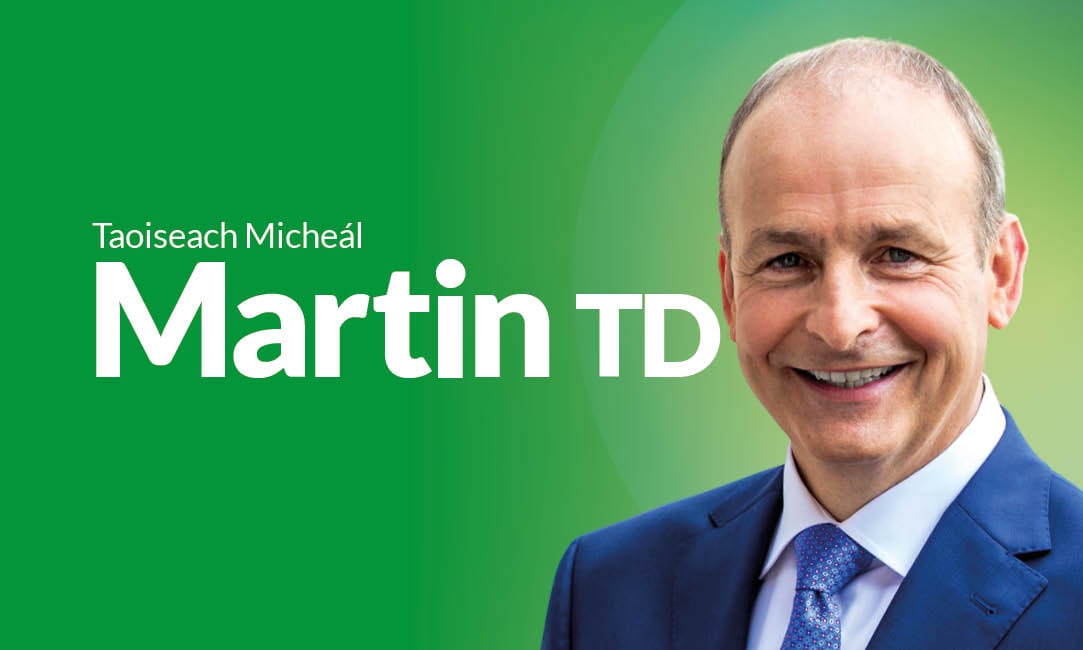Opening remarks by Taoiseach Micheál Martin TD Launch of ESRI Shared Island report A North-South Comparison of Education and Training Systems: Lessons for Policy
Published on: 29 April 2022
I want to warmly welcome this ground-breaking report by the Economic and Social Research Institute on education systems and outcomes on the island of Ireland - commissioned under the research partnership with my Department’s Shared Island unit.
This wide-ranging research programme has already published three significant reports in recent months.
Analysing the structure and collaborative potential of the services economy; foreign direct investment; and of primary healthcare systems - all on an island-wide basis.
And, work is underway to be published later this year on: renewable energy; productivity; and looking at migrant integration and early years’ experience and policy, North and South.
This partnership with the ESRI is a major part of my Department’s Shared Island research programme, through which we are providing a base of impartial evidence and analysis about the island of Ireland, as part of the Government’s Shared Island initiative.
The Government wants to see this research inform policy planning, political debate and agreed actions on how we work for a more equitable, connected and prosperous shared island in the years immediately ahead, underpinned by the Good Friday Agreement.Today’s report, remarkably, is the first ever systematic examination of education systems, North and South, from primary through to tertiary levels.
So, the research is addressing a real gap in the evidence and understanding we have on:
- How our different education systems serve students, families and communities;
- How we could learn from each other North and South on education delivery and reform;
And,
- How we can do more together to enhance educational experience and outcomes for all.
I believe these must be central concerns for our work through the Good Friday Agreement in the time ahead.
Education is our bedrock - as individuals and as a society. It is the Great Enabler.
And, in terms of the Peace Process, the prospects, experience and perspectives that higher levels of education afford are pivotal in enabling better mutual understanding across different communities and political traditions, North and South.
The Chinese thinker, Confucius, wrote long ago “Education breeds confidence. Confidence breeds hope. Hope breeds peace.”
It is no less true today, in this part of the world.
Education is fundamental to how we will make the journey of reconciliation together on this island.
And we have a strong basis for working to that end through the framework of the Good Friday Agreement:
- Via the North South Ministerial Council, both Administrations can cooperate on a range of Education concerns, including on disadvantage, special needs and teacher education;
- The British Irish Council also includes a Work Sector on Early Years;
- Through the PEACE PLUS programme - the European Union, UK Government, Irish Government and the Executive - will provide very significant funding over the next seven years to support Shared Education and Skills initiatives across the island;
And,
- Higher and Further Education Institutions, North and South, are keen to strategically deepen their cooperation in the years ahead, with support from both Administrations.
Today’s ESRI research provides compelling evidence and analysis on why we need to get the most out of all of these channels of cooperation, and where we need to focus that work.
There will be much to consider and discuss from this research.
This morning, I’d like to offer three initial reflections for the Government:
Educational underachievement
First - there is a need and a rationale to step up all-island cooperation on tackling educational underachievement.
Today’s ESRI report sets out clearly that, unfortunately, overall education achievement and school completion rates in Northern Ireland lag behind both the rest of the UK and Ireland.
As does the impact of efforts in recent years to support education attainment in disadvantaged communities.
In the South, while there is no room for complacency, our DEIS and School Completion programmes have achieved important, sustained improvements over the last decade.
I know that this position is a serious concern for political and community leaders and for all involved in education in Northern Ireland.
The Executive has rightly put a focus on addressing it - last year agreeing to take forward the recommendations of the ‘Fair Start’ report of the Expert Panel on Educational Underachievement.
I have long made the case for both Governments as co-guarantors of the Good Friday Agreement to do more support the Executive in this area.
The unique community context and legacy in Northern Ireland, does mean that education reform and meeting the needs of marginalised communities is more complex.
But it also means that the role of education in enabling individual and community progress and well-being is all the more important.
Clearly, the Government here doesn’t have all the answers. But as a partner for the Executive, we do have a uniquely comparable scale and structure of education, deep professional and societal connections, and a strong tradition of cooperation in the sector.
And together with the UK Government, the Irish Government has a sincere concern, as a co-guarantor of the Agreement, to see that every young person in Northern Ireland has access to the best possible educational opportunity.
That is why the Government will seek to work with the Executive and the UK Government to enhance our cooperation and support on educational attainment issues in Northern Ireland in the time ahead.
It is an important part of how we can work together for a shared future on this island for all.
Further and higher education
A second take away from today’s research is the scope there is for new and exciting collaboration on further and higher education and training.
We are at a point of significant reform and reflection in this area, North and South.
In this jurisdiction, the Government is introducing the most radical changes to the Leaving Certificate exam in half a century, and is delivering a genuine step change in higher education through the creation of Technological Universities.
The focus of our reforms and our investment is to empower every person to reach their full potential.
And, in Northern Ireland, the Executive has commenced an independent review of education at all levels and recently launched a new Skills Strategy.
Today’s ESRI report elaborates the comparable context, challenges and interest in both jurisdictions in providing more pathways to higher levels of education. That are attuned both to the needs of students and to current and future skills demands and opportunities.
There is real potential both for learning and exchange, North and South, and also cooperation to jointly do new things.
For instance, the stakeholder consultation in today’s research identified broad interest in looking at an all-island approach to apprenticeships.
To take more account of the significant training, employment and business opportunities on a cross-border basis - for established trades and newer skills, like advanced manufacturing.
A cross-border apprenticeship programme is already a commitment under the Government’s Action Plan for Apprenticeships, that we want to progress with the Executive.
And, through PEACE PLUS we will work with the Executive to deliver a wide-ranging skills development programme, including to support the delivery of cross-border courses by further and higher education institutions.
The Government also wants to support more student mobility, at all levels of education, both on this island and between Ireland and Britain, and this is being examined by our Department for Further and Higher Education Research, Innovation and Science.
New and exciting collaborations are already happening. Through our Shared Island Fund, the Government has already delivered a major, new €40m North South Research Programme, which is now underway.
Bringing together researchers and 3rd level institutions to engage in collaborative work that will strengthen the island’s reputation for innovation and research excellence.
And we want to move ahead this year with the Executive and the UK Government to establish new all-island research hubs, supporting through the Shared Island Fund and by Science Foundation Ireland.
To bring industry, research agencies and institutions together to conduct world-leading r&d, in areas of common priority for both jurisdictions.
Enhancing our collective FDI offering and indigenous enterprise base, and supporting good jobs in towns and cities across this island.
North South cooperation
A third reflection on today’s report is on the views from stakeholders on how, in real terms, we build can up more ambitious, impactful all-island cooperation in the education sector.
There is interest the sector in getting beyond ad hoc, intermittent or project-specific approaches. To more strategic interaction on the big shared concerns like tackling educational disadvantage and meeting special educational needs.
This also came through strongly in a Shared Island Dialogue event on Education, that the Government convened in October with more than 130 education and civil society leaders.
Achieving that more strategic, impactful cooperation - to benefit all communities on this island - is a core objective of the Government’s Shared Island initiative.
Today’s research concludes - in my view quite rightly - that “simply mandating cross-border cooperation” won’t work.
It suggests an emphasis on ways that “facilitate cooperation in a mutually beneficial and self-reinforcing way around areas of mutual interest”.
The success of the Standing Conference on Teacher Education, North South is highlighted as a model.
These are important points to consider further as we seek to build engagement and consensus, to deliver our Shared Island goals, on Education and indeed in other policy areas.
Finally, the research refers to the importance of sustained political buy-in in making progress.
This was also a conclusion of the National Economic and Social Council in a report to Government published earlier this month on Shared Island opportunities in a range of areas.
And clearly, political leadership - by all with a role and responsibility - is fundamental, in getting beyond the current issues around Brexit and the Protocol.
And in returning the focus to supporting progress and prosperity in Northern Ireland, and through the North/South and East/West dimensions of the Good Friday Agreement.
Next week, the people of Northern Ireland will vote to provide a new democratic mandate for the devolved power-sharing institutions at Stormont.
It is vital for the future of Northern Ireland and for relationships on these islands that the political parties take their mandates from the Assembly elections and move quickly to form a new Executive.
That is what the people of Northern Ireland want.
This is a moment for political leaders to live up to the commitments of the Good Friday Agreement, which is overwhelmingly supported by people across this island.
And in this context, I am reminded of the words of then Minister for Education Donogh O’Malley when, in a defining moment of leadership he announced the introduction of free secondary education for all in this jurisdiction in 1966.
This transformed the prospects of tens of thousands of children, and it was part of the sustained investment in education that has been the cornerstone of the economic and social progress we have made in decades since.
O’Malley encapsulated the need for urgent, concerted, sustained action by saying simply:
“We will be judged by future generations on what we did for the children of our time”.
We need to keep that same clarity of focus and spirit of action in view today.
And work to take up the full potential of the Good Friday Agreement – in Education and across all areas of common interest – to build a shared, prosperous, inclusive future for all communities on this island.
That will remain the guiding focus for the Government as a co-guarantor of the Good Friday Agreement.
Thank you.

.jpg)
